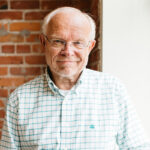Skeptical About ‘Steps’ to Prayer?
When I read or hear someone tell me there are five steps or three steps to prayer, spiritual formation, or knowing God, I become skeptical. I once took a 10-booklet course on steps to Christian maturity. I filled in all the blanks, read, and prayed, but two months later, I still wasn’t mature. Did I miss a step, or did it just not take? Was it the course—or was it the student?
Psalm 5: A Blueprint for Prayer
When I read Psalm 5 the other day, the image of a blueprint came to mind. I wrote in my journal: “Psalm 5 is a blueprint for prayer.” Or even better—what if it invites us to imagine what might be in the mind of an architect who draws up such a blueprint? It’s a visual representation of the architect’s craft, artistry, and imagination.

What Prayer Teaches Us About God
Prayer is addressed to God. It is personal, not a mere shout into an empty sky. He seems to have prior experience with God. God is not an anonymous and distant being, far off and unfamiliar. What the psalmist knows of God is expressed in the form of his prayer.
Just as we learn from what Jesus said, we also learn from what Jesus did and how Jesus moved about in his community, prayers, and teachings.
How the Psalmist Prays
We speak: It’s vocal in the Psalm: “Give ear to my words…” The psalmist speaks words that name the reality of his life before God.
- Groaning. He doesn’t hide his pain.
- The sound of his cry. His prayer is offered honestly to God.
- The sound of my cry. What do I bring to God in my morning prayer?
And then we worship: “In the morning, I prepare a sacrifice for you and watch” (v. 3). We watch.
God as the Architect
It’s clear from his words that there is an expectation: something will either arise in God to address the cause of our groaning or stir within us. Sometimes prayer becomes a call to action—toward change, reconciliation, healing, or love. Yes, I mean that: sometimes I am the answer to the prayer I bring to God.
You can’t miss verse 7: God’s invitation is unmistakable—“I, through the abundance of your steadfast love, will enter your house.”
So maybe I misunderstood: What if God is the architect, not the psalmist? If that’s true, then there is a door standing open because God’s love invites me in.
Perhaps that is the answer to all our prayers: we beg, plead, and intercede, but still I wonder—why do I so often remain outside God’s home?
Faith as Expectation: Waiting at the Door
Faith is an act of expectation as we wait at that open door. At dawn, a human voice speaks out loud, and God answers. God opens the door, and God provides a shield of protection in the battles we face.
Practice: What Stops You From Opening the Door?
Is there something that keeps you from opening the door? Name it, and include it tomorrow in your morning prayer.
Then, consider sharing this “blueprint for prayer” with someone—especially a mentor or mentee. Talk together about what you notice in Psalm 5, how it shapes your prayers, and what it stirs in you about God’s open invitation.
And finally, share what you notice right here in the comments. Your reflection might encourage someone else who is waiting at the open door.
_______________________________

Keith Anderson, D.Min., is a Faculty Associate for Spirituality and Vocation at VantagePoint3 and President Emeritus of Seattle School of Theology and Psychology. He is the author of several books, including his most recent: On Holy Ground: Your Story of Identity, Belonging and Sacred Purpose (Wipf & Stock, 2024). His other works include Reading Your Life’s Story (IVP, 2016), A Spirituality of Listening (IVP, 2016), and Spiritual Mentoring (IVP, 1999). In his writing, teaching, and mentoring, Keith seeks to set a table for people looking to enter the “amazing inner sanctuary of the soul” in the most ordinary and extraordinary moments of life.


4 Comments
As I was reading this today, the point of prayer possibly leading to a call to action became alive again in real time. I noticed a business card of an acquaintance who has done some work for me sitting on my desk. My last interaction with him was disappointing, as he left me in the lurch and bailed on a job that I had for him the day of the job. I eventually found out why and that he was in a pretty bad place from grieving the loss of a child. So today, I phoned him to just check up on his state of being. He is doing much better, although the grief still shows up at times with no warning. I think that he was blown away by my call and that I had been praying for him. It wasn’t a long conversation or very profound, but just the reality of someone caring enough to check in was enough to bring him close to tears. Enough said. Keith, thanks again for the reminder that prayer often leads to the Spirit pointing us to be a part of the answer to our own prayer.
Garth: We experience holy ground in unexpected ways when we both listen and respond. The surprise in your story is that you were part of the answer to your own prayer. It is not a surprise that it happens that way; it is a surprise that we become co-writers in the heartbreaks of others, so often, because we didn’t know the tragedy that strikes. Your sensitive heart and simple phone call! You didn’t have to pay attention to the whisper that came, the nudge that tapped you to pick up your phone. Because you did, I know the Spirit touched your friend and their family. Thank you for sharing a moment when the Spirit touched you in order to touch your friend.
Thanks Keith. I appreciate your notion here that Psalm 5 can be “a blueprint for prayer.” I seek, and struggle so many times, to lift my mind and heart toward God. your thoughts around psalm 5 offered me this morning a posture/ mindset and some steps of turning my face toward the one whose face is always turned toward us…
Brother Rob: We who teach prayer are sometimes in need of the classroom of prayer ourselves. Your two words are the curriculum: a posture of prayer and the mindset followed by steps toward the face who is turned toward us…and through us…toward others in need of simple acts of love. Your transparency is a gift to me today.